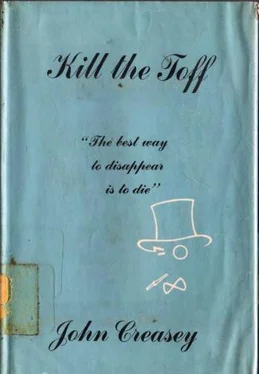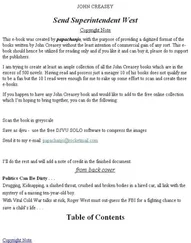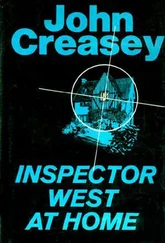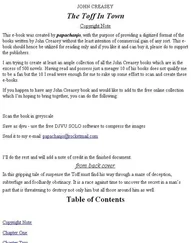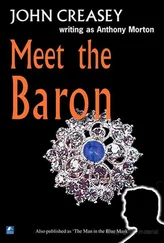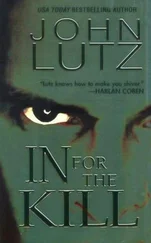John Creasey - Kill The Toff
Здесь есть возможность читать онлайн «John Creasey - Kill The Toff» весь текст электронной книги совершенно бесплатно (целиком полную версию без сокращений). В некоторых случаях можно слушать аудио, скачать через торрент в формате fb2 и присутствует краткое содержание. Жанр: Старинная литература, на русском языке. Описание произведения, (предисловие) а так же отзывы посетителей доступны на портале библиотеки ЛибКат.
- Название:Kill The Toff
- Автор:
- Жанр:
- Год:неизвестен
- ISBN:нет данных
- Рейтинг книги:5 / 5. Голосов: 1
-
Избранное:Добавить в избранное
- Отзывы:
-
Ваша оценка:
- 100
- 1
- 2
- 3
- 4
- 5
Kill The Toff: краткое содержание, описание и аннотация
Предлагаем к чтению аннотацию, описание, краткое содержание или предисловие (зависит от того, что написал сам автор книги «Kill The Toff»). Если вы не нашли необходимую информацию о книге — напишите в комментариях, мы постараемся отыскать её.
Kill The Toff — читать онлайн бесплатно полную книгу (весь текст) целиком
Ниже представлен текст книги, разбитый по страницам. Система сохранения места последней прочитанной страницы, позволяет с удобством читать онлайн бесплатно книгу «Kill The Toff», без необходимости каждый раз заново искать на чём Вы остановились. Поставьте закладку, и сможете в любой момент перейти на страницу, на которой закончили чтение.
Интервал:
Закладка:
Rollison thought: “We should be all right now.”
He actually moved to speak to Snub when he saw a car swing out of a side turning and come in their wake. Brilliant headlights shone out, dazzling him. He backed quickly away and dropped his hand to his pocket—but he probably wouldn’t need a gun; this was more likely a police car than one of Waleski’s.
Snub called: “What’s up? Trailed?”
“Yes.”
“Is Mellor snug and tight?”
“Yes. I’ll keep him steady; you shake ‘em off if you can.”
“Right.”
Rollison knelt down by the side of the unconscious man, putting his arms across the divan to make sure that Mellor couldn’t roll off. Snub swung round a corner and the divan shifted; another and it swayed the other way.
Mellor didn’t stir beneath the bedclothes.
The bright light still shone into the back of the van. It disappeared as they swung round another corner then appeared again, casting grotesque shadows.
“They’re clinging,” Snub said. “Police?”
“Afraid so.”
“Have to see it through now. Hold tight.”
They swung right, then sharp left. The divan skidded and would have tilted badly had Rollison not been holding it. He wished he could stand up, to judge the distance between van and car. It wasn’t easy to think and he’d never needed to think faster. If this were a police car, it was probably equipped with radio. Radio patrol cars throughout London and the Home Counties might soon be on the look-out for the van; the call had probably gone out. The chances of escaping were negligible, unless they went to earth somewhere near, stranded the van and hid Mellor.
With anyone else that would have been easy: Ebbutt’s flat, the gymnasium, one of a dozen pubs or Bert’s garage would all have offered sanctuary. But no one would willingly help Mellor against the police.
He heard a splintering sound and glanced round. The glass of the left side window crashed in.
Snub whistled. “That’s Waleski! Hold tight!”
A second shot struck the wing of the van as they turned another corner.
Rollison called: “Get on to a straight road and keep there for a bit.”
“Aye, aye, cappen—we’re on one now.”
“Go as fast as you like,” said Rollison.
He stood up and went to the smashed window. The blinding glare of the following car’s headlights made him narrow his eyes. All he could see was the sheet of light and the twin orbs of the lamps themselves; there was no dark shape behind. He stood to one side and poked his gun out of the window.
He fired, blind. Nothing happened. He raised the gun a shade and fired again. Still no result. The roar of the shot inside the van was deafening, high above the sound of the engine and the rattling of the chassis.
He fired a third time. One of the lights went out and the car swerved. He moved in front of the window and saw the dark outline of the car which was nearly broadside-on. He fired twice towards the driving-seat and heard the squeal of brakes as the report of the shots died down. “Twist and turn about now,” he ordered. “Nice work,” breathed Snub. The van swung round another corner as
Rollison bent over Mellor.
* * *
The car didn’t appear again and they were soon out of London.
* * *
“Well!” gasped Mrs Begbie. “Well, this is a surprise. And at this hour, too: I can’t understand it. Who did you say you are? Mr Rollison? A friend of Sir Frederick’s? Well!”
She blinked at the pale blue note-paper on which Arden had written to her and then blinked at Rollison who stood in the tiny parlour of the cottage. She wore a grey blanket dressing-gown, her thin grey hair was done up tightly in steel curlers, her eyes were bright. She was a small woman with sharp features and full lips—not a kindly soul, judging from appearances; probably an irascible old woman.
“Well! And who is the man you’ve brought? Sir Frederick doesn’t say.”
“A young friend of his,” said Rollison.
“Young friend? Not a woman? ” the old voice sharpened.
“No, a man.”
“Well! Well, I suppose I’d better see what I can do; but it’s a long time since I looked after anyone who was sick—really sick. I’m not so young as I used to be, you know; my old bones don’t like work. But, thanks to Sir Frederick, they don’t have to do much. Bring him in, sir, bring him in. He’ll have to have the box-room; but there’s a window there. It’s quite sweet and clean and my niece slept there only last Sunday, so it’s properly aired. I can’t do less than take him in, can I? But I’ll have to think about it in the morning. I know what I shall do—I shall telephone Sir Frederick, that’s what I shall do. I’ll go and turn the bed down now. Mind the stairs, they’re rather steep, and mind you don’t bang his head, there’s a nasty turn. And he’ll have to sleep in the box-room—”
She went off muttering to herself.
Half an hour later Rollison drove away in the van. Snub was sitting in the parlour, drinking a cup of tea with Mrs Begbie and listening to what she was going to do.
Rollison pulled up half a mile from the cottage and watched the road leading to it. He saw no traffic, no one appeared to be approaching. He doubted whether Mellor would be traced there; if he were—well, Snub was armed now and had strict instructions to send for the police if there were another emergency. There were limits to what Rollison could do alone. He wondered whether he were justified in submitting the old woman to the risk of an attack from Waleski, whether the time had really come for handing Mellor over to the police.
Waleski meant to kill the youth who might be safer in custody.
But the murder of Galloway could still be “proved” against him. Only desperate men would have made the attacks tonight; and if Waleski were desperate he would probably make a fatal mistake. Risk or no risk, he must try to lure the man to go far enough to hang himself.
Jolly, bleary-eyed but still dressed, struggled up from an easy-chair as Rollison came in.
“Sit back and relax,” said Rollison. “You ought to have gone to bed.”
“I simply couldn’t, sir. Is everything all right?”
“No one who matters is dead. The pace is hotting up and we may find it gets too hot. We really started something when we championed young Mellor. Any messages?”
“Only from the taxi-driver, sir!”
“Only!”
“He left Arden Lodge at two-fifteen, just after Waleski’s car was put into the garage.”
“Hardly a trifle,” murmured Rollison and studied Jolly’s lined face. His eyes were heavy with sleep but his shoulders were erect. “Did you look at The Times yesterday?”
“Unfortunately I have done no more than glance at it,” said Jolly, is there anything of interest?”
“Have a look at the Situations Vacant column,” said Rollison and Jolly turned to the desk to pick up the folded copy of The Times. He studied the advertising page carefully, suddenly started and lowered the paper.
“A first footman is required at Arden Lodge. Why, that is remarkable, sir. I could apply—”
“You can apply but it isn’t remarkable and the job’s yours. I fixed it with Sir Frederick last week and arranged with The Times to get it inserted quickly. But that was before Waleski blew in. He’s seen you—one of our mistakes, Jolly. If you go to the Lodge—”
“I don’t think it can be assumed that Waleski is going to take up residence, sir.” Jolly showed surprising eagerness for a new post, it is true that we did meet but he is not likely to have described me in any detail to those persons— if in fact there are more than one—whom he knows at the Lodge. If it were possible for me to examine the situation there at first hand then we might well find that a logical explanation of Waleski’s influence at the house will greatly assist in solving the major problem.”
Читать дальшеИнтервал:
Закладка:
Похожие книги на «Kill The Toff»
Представляем Вашему вниманию похожие книги на «Kill The Toff» списком для выбора. Мы отобрали схожую по названию и смыслу литературу в надежде предоставить читателям больше вариантов отыскать новые, интересные, ещё непрочитанные произведения.
Обсуждение, отзывы о книге «Kill The Toff» и просто собственные мнения читателей. Оставьте ваши комментарии, напишите, что Вы думаете о произведении, его смысле или главных героях. Укажите что конкретно понравилось, а что нет, и почему Вы так считаете.
